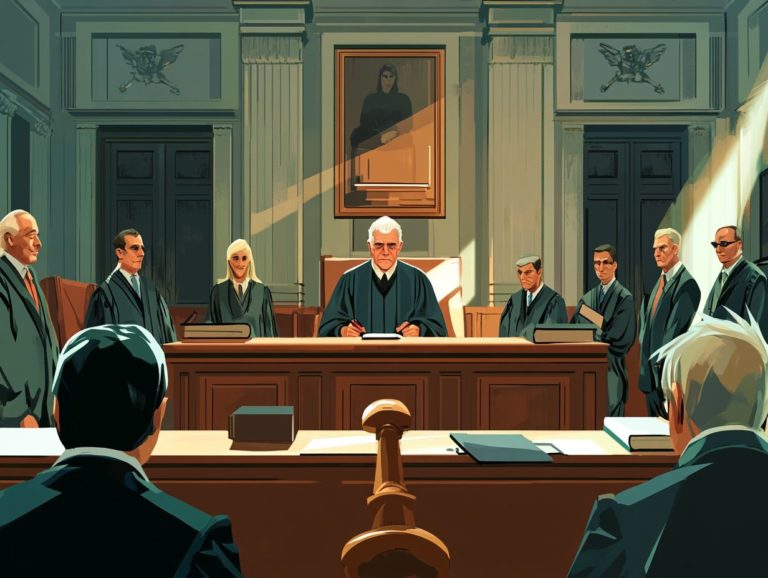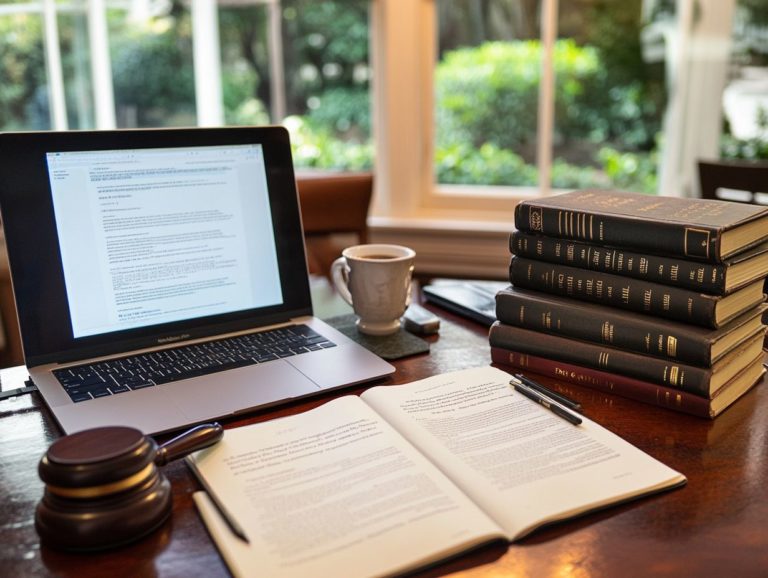International Jurisdiction in IP Litigation Cases
In a world where innovation transcends borders, understanding international legal authority in intellectual property (IP) litigation is essential for you as a business owner or creator.
This article explores the intricacies of legal authority, highlighting key factors such as the locations of the parties involved, the nature of unauthorized use, and the terms of contractual agreements.
It also tackles the hurdles presented by varying legal systems and cultural differences. You will discover effective strategies to navigate these complicated legal issues, including recent developments shaped by globalization and technology.
Discover insights that will transform how you handle international IP disputes!
Contents
- Key Takeaways:
- Understanding International Legal Authority
- Factors Affecting International Legal Authority
- Challenges in International IP Litigation
- Strategies for Navigating International Jurisdiction
- Recent Developments in International IP Litigation
- Frequently Asked Questions
- What is international legal authority in IP litigation cases?
- How is international jurisdiction determined in IP litigation cases?
- Which countries have jurisdiction in an international IP litigation case?
- What happens if multiple countries have jurisdiction in an international IP litigation case?
- Are there any international treaties or agreements that address jurisdiction in IP litigation cases?
- What should I do if I am involved in an international IP litigation case?
Key Takeaways:

Understanding international legal authority is crucial in IP litigation, as it determines which court can hear a case and enforce a judgment, especially when considering the challenges of cross-border IP litigation.
Factors like the location of the parties and unauthorized use can affect legal authority. You need to consider these aspects carefully to enforce IP rights effectively across different countries.
Understanding International Legal Authority
International legal authority is vital in the realm of IP litigation, especially as specialized IP courts become key players in navigating IP law across borders to address complex intellectual property disputes.
These courts enhance access to justice while elevating the quality of outcomes by utilizing judicial expertise that is finely attuned to the intricacies of IP law.
As global trends increasingly favor specialized judicial processes, understanding international legal authority is essential for you as an IP owner or third party navigating the complicated legal issues of enforcement and litigation.
Factors Affecting International Legal Authority
Several factors profoundly influence international legal authority in intellectual property disputes, particularly regarding the location of the parties involved and the geographical context of the unauthorized use.
Your understanding of these elements is paramount, as the determination of legal authority often depends on them, alongside any agreements or contracts that may dictate applicable laws and procedural rules.
Grasping these intricacies is essential for effectively enforcing IP rights across diverse territories and legal systems.
Location of the Parties Involved
The location of the parties involved in an intellectual property dispute plays a crucial role in shaping international legal authority and the enforcement of IP rights. This geographical positioning dictates which court will oversee the case and establishes the legal framework governing the dispute, including understanding copyright infringement in IP litigation.
Different jurisdictions come with their own set of laws, which can dramatically shift the balance for both plaintiffs and defendants. For example, if you re a plaintiff based in a country with robust IP laws, you may find it significantly easier to assert your rights when taking on a defendant in a more lenient or ambiguous jurisdiction.
This interplay creates a landscape where strategic choices about where to file a lawsuit become essential, alongside navigating the complexities of international treaties and regional agreements that influence the protection of intellectual property.
The geographical location of the unauthorized use is pivotal in determining international legal authority in IP litigation. This factor becomes particularly important when you consider the diverse legal frameworks that exist across regions, as specialized IP courts rely on local laws to handle cases effectively and are influenced by the impact of globalization on IP litigation.
For example, if an unauthorized use occurs in a jurisdiction recognized for its strong IP protections, you may find it significantly easier to enforce your rights. In contrast, if the violation happens in an area with lax enforcement mechanisms, the courts’ ability to impose remedies could be greatly compromised.
Therefore, the relationship between location and legal authority can either bolster or weaken enforcement efforts, ultimately shaping the landscape of litigation.
Explore your own jurisdictional challenges as they relate to your IP rights!
Agreements and Contracts

Agreements and contracts between parties can shape international jurisdiction in intellectual property disputes. These documents often define specific locations for resolving conflicts, which can either ease or complicate your intellectual property rights.
A carefully crafted contract may specify that disputes from licensing agreements will be settled in a specific legal system. This gives you clarity and predictability, allowing you to navigate potential conflicts confidently.
Take the landmark case of MGM Studios Inc. v. Grokster, Ltd.; here, jurisdictional clauses were key in determining the legal action. By choosing jurisdictions known for strong IP protection, you can boost your chances of favorable litigation outcomes, as highlighted in the discussion on understanding the role of the court in IP litigation.
Your choice of legal frameworks can significantly impact IP enforcement and compliance across borders.
Challenges in International IP Litigation
International IP litigation brings challenges from the different laws and legal systems across jurisdictions. This diversity complicates dispute resolution, especially with specialized IP courts involved, as highlighted in the global landscape of IP litigation today.
Language and cultural barriers can also hinder communication. Successfully navigating these complexities is crucial for positive outcomes in global intellectual property disputes.
Differences in Laws and Legal Systems
The varying laws and legal systems across countries create significant challenges in international IP litigation. These differences affect how you enforce IP rights and the effectiveness of court processes.
For instance, different interpretations of patent eligibility might lead you to choose a jurisdiction that offers a more favorable legal landscape. This scenario often results in choosing the best place to file a case.
In the European Union, the Unitary Patent system aims to simplify such disputes. However, countries outside the EU often have contrasting requirements, complicating your litigation strategy.
Specialized IP courts in the U.S. and Germany have set protocols to tackle these inconsistencies. This approach enhances both court efficiency and understanding of complex technical matters involved in IP cases.
Language and Cultural Barriers
Language and cultural barriers can create significant challenges in international IP litigation. They can complicate communication and understanding between parties from different jurisdictions.
These obstacles can obstruct essential information flow and distort the intent behind legal arguments. Misinterpretations may lead to unfavorable outcomes, as decisions might rely on misunderstandings rather than the case merits.
Interpreters play a crucial role in this context. They must convey nuanced meanings that differ across cultures, not just translate words.
Engaging professionals who understand both the legal and cultural landscapes is vital. This ensures they can navigate complex disputes effectively.
You must develop effective strategies to navigate international jurisdiction now, especially if you’re facing complex disputes. Choosing the right jurisdiction can greatly affect the enforcement of judgments and your litigation success.
This strategic approach is crucial for maximizing your chances of favorable outcomes in international IP litigation.
Choosing the Right Legal Authority

Choosing the right legal authority is a crucial step in international intellectual property (IP) disputes. This choice can significantly influence both the litigation process and the enforcement of your IP rights, especially when you consider the role of IP lawyers in international cases.
Your decision will depend on several factors. These include the geographical location of the parties involved, the specific nature of the infringement, and the reputation of specialized IP courts in handling similar cases.
If you’re a company based in Europe, pursuing claims in a jurisdiction known for strong IP protection may be beneficial. For instance, a technology firm in the United States once achieved a favorable ruling that capitalized on the jurisdiction’s robust stance on patent rights.
These strategic choices can lead to successful outcomes in complex international disputes.
Enforcing Judgments in Different Countries
Enforcing judgments in international IP litigation presents formidable challenges. This is primarily due to varying degrees of judicial independence and diverse legal frameworks that govern enforcement in different countries.
This complexity is compounded by differing interpretations of intellectual property rights and unique procedural requirements within each jurisdiction. To navigate these international waters effectively, a comprehensive understanding of local laws and relevant treaties is essential.
IP holders frequently encounter significant hurdles, including resistance from local authorities and cultural nuances that shape the perception of intellectual property. However, compelling case studies illustrate effective enforcement strategies.
By employing international legal collaboration and leveraging established treaties, these challenges can be surmounted. This ultimately ensures that intellectual property rights are respected across borders.
Recent Developments in International IP Litigation
Exciting developments in international IP litigation are reshaping the way we resolve disputes within specialized IP courts. The profound impact of globalization and technology is evident in these changes.
As the landscape of intellectual property rights becomes more intricate, rapid advancements in technology demand innovative approaches to IP litigation. These approaches must address the dynamic nature of disputes that arise in a global context.
Impact of Globalization and Technology
The impact of globalization and technology on international IP litigation is profound. It shapes how specialized IP courts tackle disputes involving intellectual property rights.
As you navigate a world increasingly intertwined through digital connectivity and cross-border trade, the interaction between various legal systems becomes more complex. Courts frequently confront cases that extend beyond national borders, intricately weaving together elements from multiple jurisdictions.
This shift calls for a reevaluation of existing frameworks and practices. Legal systems must adapt to new technological realities. The rapid evolution of digital platforms and global information sharing presents significant challenges in enforcing IP rights against violations. However, it also opens doors for innovative solutions.
For example, case studies reveal how international cooperation has led to more effective crackdowns on online piracy. This underscores the necessity for agile legal systems that can keep pace with ever-evolving market dynamics.
Frequently Asked Questions

International legal authority in IP litigation cases refers to a court’s power to hear and decide a dispute involving intellectual property rights that extends beyond the borders of a single country, highlighting the role of national courts in international IP.
How is international jurisdiction determined in IP litigation cases?
Determining international jurisdiction in IP cases can be complicated. It involves analyzing various factors, such as the location of the parties and the infringement, as well as understanding the role of international law in IP litigation.
Which countries have jurisdiction in an international IP litigation case?
The countries with jurisdiction depend on the specifics of each case. Typically, it’s where the infringement occurred or where the defendant is located, as outlined in the legal framework governing IP litigation.
What happens if multiple countries have jurisdiction in an international IP litigation case?
If multiple countries have jurisdiction, the plaintiff can choose where to file the lawsuit. This choice should consider the strength of the legal system and the likelihood of success.
Are there any international treaties or agreements that address jurisdiction in IP litigation cases?
Yes, treaties like the Berne Convention and TRIPS outline jurisdiction in IP cases. They help resolve disputes between countries regarding intellectual property rights.
What should I do if I am involved in an international IP litigation case?
If you find yourself in an international IP litigation case, don t wait! Seek expert help immediately to understand your rights and navigate the complex process.






